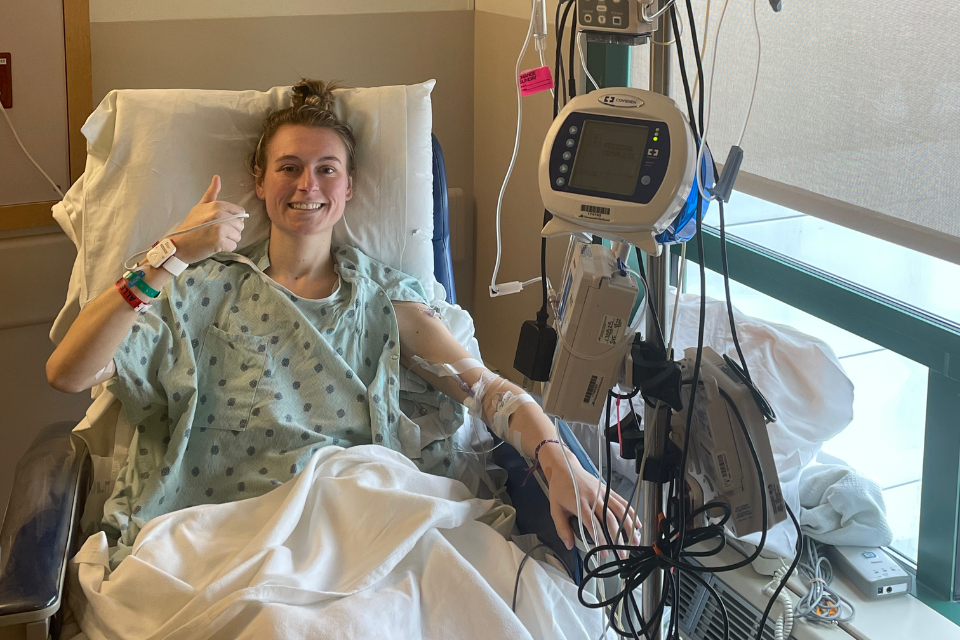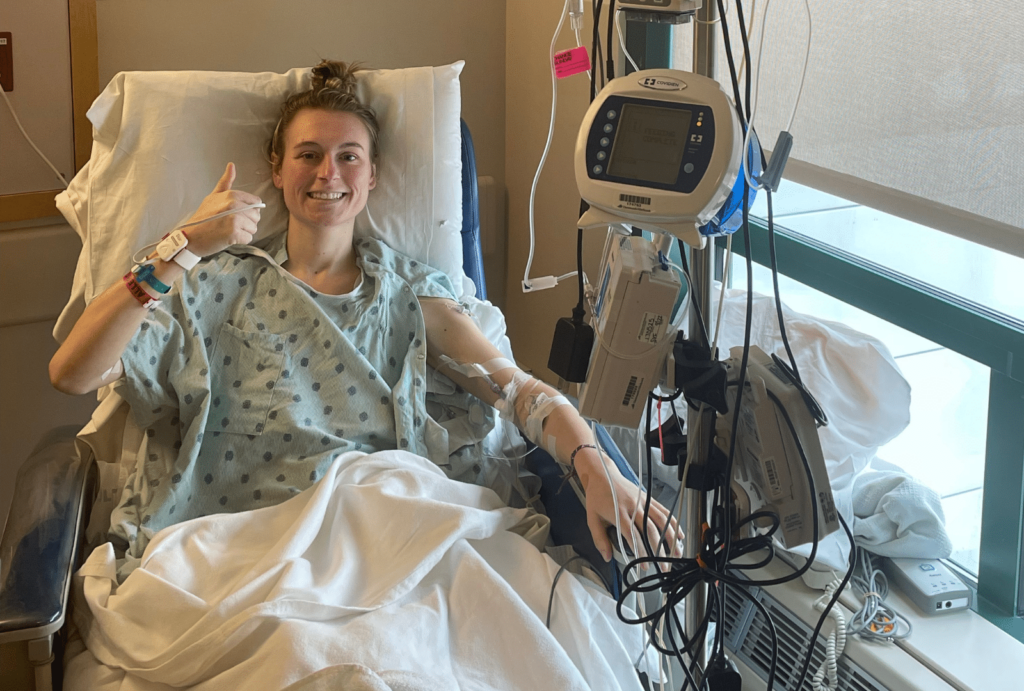Unsure of the treatment she was receiving, Elizabeth Stutzmann devised a system to establish the best care to treat her pancreatitis
In 2020, Elizabeth Stutzmann found herself in a Long Island hospital after experiencing severe abdominal pain. She was diagnosed with chronic pancreatitis – a rare condition she had never heard of before – which affects around 200,000 Americans and leads to permanent damage and scarring of the pancreas due to inflammation.
Like most patients, Liz looked to her local doctors for answers and found that they didn’t have any.
“I felt like there was a lot of ambiguity,” Liz said. “The doctors weren’t really able to help me, but they also didn’t want to admit that that was the case.”
Feeling frustrated with her situation, Liz was determined to find a solution. She turned to her laptop and began searching for a pancreatic disease center. Her search led her to a pancreatic specialist and oncologist in Long Island who set her up with a palliative care team and suggested a cholecystectomy, or the surgical removal of the gallbladder, as a possible solution.
Despite efforts from her palliative care team, her pancreatitis remained unpredictable. Unfortunately, a week before her gall bladder removal, Liz’s pancreas became highly inflamed, and that simple procedure became too complicated to perform. Months went by with no change, and no alternatives were offered to her. Once again, Liz was left without a solution.
Liz eventually transitioned from her palliative care team to a comprehensive GI team and home healthcare. Here, she was placed on a PEG (percutaneous endoscopic gastrostomy) feeding tube.
This was her life for months – eating nothing by mouth, staying home, and day-in and day-out pain.
“I’m sitting at home with a pole and a tube coming out of me. I can only drink water – very limited water, and medication. I have a home care nurse that comes twice a week. These few months of rest have been fine, but I’m still in excruciating pain every single day, and it didn’t seem like there was any progress or plan.”
Feeling like she had hit a dead end, Liz turned to social media to share her story. She posted a picture of herself with her feeding tube and explained what she had been going through. Within minutes of sharing her post, a family friend reached out to Liz and connected her with a pancreatic expert at Memorial Sloan Kettering Cancer Center.
Liz met with this new doctor, who recommended several specialists. With renewed hope, Liz decided to take control of her situation and devised a plan to establish the best care for her.
Liz’s Guide to Establishing Care
This is what Liz did to find the right team, care, and treatments for her. She gives this advice in hopes of helping others who are struggling to find good care.
1. Don’t Feel Stuck
Liz knows how overwhelming it can be for people who have experienced pancreatitis. Although seeking immediate medical assistance is crucial, according to Liz, you should not feel obligated to stick with the first doctor you are assigned to. Remember that you have the freedom to seek the best care possible and look for better opportunities elsewhere. You can take your time to find the right doctor that meets your needs and transition to a new opportunity when you feel comfortable and confident in your decision.
2. Research Ahead of Time
After consulting with the pancreatic specialist at Memorial Sloan Kettering Cancer Center, Liz took the time to research each doctor recommended to her online, along with any potential nurses that might be on her care team and the facility where she would receive treatment. You can do your own research through online resources such as Google, Google Scholar, hospital directories, and Healthgrades. When doing so, Liz strongly advises looking for the following:
- Credentials
- Education
- Fellowship and Training
- Scholarly Articles
- Facility Amenities, Parking, and Location
- Insurance and Finances
This step is crucial because not all doctors are experts in pancreatitis, even if they are gastroenterologists. A small portion of doctors specializes in the pancreas. You will know this from seeing whether they have written articles on pancreatitis, whether they are part of a pancreas center, and what their website says about their expertise. It also helps you gauge how comfortable you will be receiving treatment at a particular facility and determine whether it is feasible for you to receive care there. For instance, Liz is currently receiving treatment at Dartmouth Hitchcock Medical Center, which is a four-hour drive from her home. As a result, she may need to spend the night in that area after treatment, which means she also needs to consider the cost of lodging. Taking the time to research these aspects is critical for making informed decisions about your healthcare.
3. Have Doctor’s “Try-Out” by Ask the Hard-Hitting Questions
Meeting with potential doctors can be scary, but it’s important to ask the tough questions. Liz recommends setting up appointments with each potential doctor and secretly having them “try-out” to be in charge of your treatment. According to Liz, you can do so by asking the same questions to each doctor, so you can compare their answers and make an informed decision. Be sure to ask about their recommended treatments or surgeries, and if there’s a discrepancy between doctors, ask why. This will help you understand which treatments are best for you and who is up-to-date on emerging treatments. It’s also a chance to gauge the doctor’s listening skills and bedside manner, helping you decide who is the right fit for you. Remember, it’s essential to advocate for yourself and get the answers you need to make an informed decision about your health.
4. Nurture Relationships
Building positive relationships with your doctors and care team will help you get effective treatment. Liz advises taking the time to talk to everyone on your potential care team, which will help them better understand your history and situation, and ultimately, better your care. For example, by building relationships with her nurses, Liz’s appointments have become more enjoyable, and she is also promptly notified about new treatments she could partake in.
Another thing Liz notes is to remember that doctors and healthcare professionals are human too, and maintaining positive relationships with your previous care team can benefit you in the long run. By leaving on good terms, you increase the likelihood of better care if you ever need to return to them or need more immediate assistance that they’re able to provide. Maintaining this connection can also make it easier to reach out to them for support or guidance if needed.
5. Use The Tools Available To You
When moving to a new care team, Liz stresses the importance of using all available resources. One such resource is an online portal, which can quickly transfer information and consolidate all your paperwork and information in one location. This can enable new care teams to efficiently understand your medical history and provide more prompt and effective care.
Another underutilized resource Liz recommends is hospital caseworkers and social workers. These professionals are employed by hospitals and can assist you in completing paperwork and setting up treatments with greater ease. By taking advantage of these tools, you can streamline your transition to a new care team and receive the care you need as quickly and efficiently as possible.
6. Use Your Voice
According to Liz, one of the most important tools for effectively navigating the healthcare system is your voice! Don’t be afraid to ask questions or seek help when you need it. Remember that, while healthcare professionals are there to support you, ultimately, you are your own best advocate.
Using your voice also means being honest about your concerns, fears, and preferences with your care team. Don’t be afraid to speak up if something doesn’t feel right or if you need more information about a particular treatment or medication. It’s your job to be informed about your condition, treatment options, and any potential risks or benefits associated with different approaches. By being an active participant in your care, you can ensure that you receive the best possible treatment and achieve the best possible outcomes. Remember, your voice matters!
Final Thoughts
Liz’s proactive approach to finding the right care team and advocating for herself ultimately led her to Dr. Gardner at Dartmouth Medical Center. After asking the hard-hitting questions and building a strong relationship with her new care team, Liz underwent surgery and received treatments that significantly improved her quality of life. She felt supported and heard by her new team, and her experience serves as a reminder of the importance of being an active participant in your own healthcare journey.
Share Your Story
Your story matters. If you’re living with pancreatitis or caring for someone who is, your experience can inspire and empower others who are going through the same thing. That’s why we want to hear from you! Share your story with us by clicking the button below.


